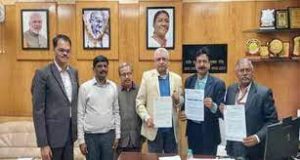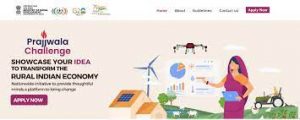Today’s Current Affairs: 4th January 2023 for UPSC IAS exams, State PSC exams, SSC CGL, State SSC, RRB, Railways, Banking Exam & IBPS, etc
Table of Contents
Outreach Programme For Awareness Of Cryptocurrencies And Online Gaming:

The Investor Education and Protection Fund (IEPF) will launch an outreach programme to create awareness of Cryptocurrencies and Online Gaming.
- The need for the outreach programme is based on the observation that both crypto-assets and online gaming (that extends to gambling and betting) are still being promoted in a risky manner despite the recent turmoil in the sector.
- The programme will help potential investors to thoroughly educate themselves before making any decision since cryptocurrency investing is a complex and risky endeavour.
- It is managed by the IEPF Authority, which was set up in 2016 under the provisions of Section 125 of the Companies Act, 2013.
- The Authority is entrusted with the responsibility of administration of the IEPF, which, besides promoting awareness among investors, makes refunds of shares, unclaimed dividends, matured deposits and debentures and so on to rightful claimants.
- As for investment education, the idea is to reach out to household investors, housewives and professionals alike in rural and urban areas and teach them the basics.
- Focus areas include primary and secondary capital markets, various saving instruments, the instruments for investment (such as mutual funds, equity, among others), making investors aware of dubious Ponzi and chit fund schemes and existing grievance redressal mechanisms, among other things.
Draft Rules For Online Gaming:

The Ministry of Electronics and IT (MeitY) has released the Draft Rules for Online Gaming.
- The proposed rules have been introduced as an amendment to the Information Technology (Intermediary Guidelines and Digital Media Ethics Code) Rules, 2021.
Draft Rules:
- Online games will have to register with a self-regulatory body, and only games cleared by the body will be allowed to legally operate in India.
- The self-regulatory body will have a board of directors with five members from diverse fields, including online gaming, public policy, IT, psychology and medicine.
- There could be more than one self-regulatory body and all of them will have to inform the Centre about the games they have registered along with a report detailing the criteria for registering.
- Online gaming firms will be required to undertake additional due diligence, including KYC of users, transparent withdrawal and refund of money, and a fair distribution of winnings.
- For KYC, they will have to follow norms laid down for entities regulated by the Reserve Bank of India (RBI).
- Gaming companies will also have to secure a Random Number Generation Certificate, which is typically used by platforms that offer card games to ensure that game outputs are statistically random and unpredictable.
- They will also have to get a “no bot certificate” from a reputed certifying body.
- Online gaming companies will not be allowed to engage in betting on the outcome of games.
- Similar to social media and e-commerce companies, online gaming platforms will also have to appoint a compliance officer who will ensure that the platform is following norms, a nodal officer who will act as a liaison official with the government and assist law enforcement agencies, and a grievance officer who will resolve user complaints.
Stem Cell-derived Mitochondria Transplantation:

Six children with rare disorders caused by deletion in the genomes of their mitochondria were successfully treated for the first time by Stem-cell derived Mitochondria Transplantation.
- The process involved the mitochondrial transplant from donor mothers into children’s haematopoietic stem cells, which give rise to all types of blood cells.
- Stem Cell-derived Mitochondria Transplantation involves the spontaneous mitochondrial transfer of the stem cell to rescue the injured cells or the injection of stem cell isolated mitochondria into the injured area to repair the damage.
- Stem cells are the most primitive cells at the top of the origin of cell lines, and they have a high capacity for differentiation and self-renewal.
- In addition, stem cells can differentiate into various tissues, organs, or functional cells of the human body; therefore, stem cells hold great promise for therapeutic tissue engineering and regenerative medicine.
Savitribai Phule Birth Anniversary:

The Prime Minister has paid homage to Savitribai Phule on her birth anniversary.
Savitribai Phule:
- A pioneer who challenged oppressive social norms in her quest for women’s education, equality and justice, Savitribai Phule is formally recognised as India’s first woman teacher.
- A Dalit woman from the Mali community, Savitribai was born on January 3, 1831, at Naigaon in Satara District.
- In 1840, at the tender age of 9, she was married to Jyotirao (also known as Mahatma Jyotiba Phule one of the leading social reformers and anti-caste activists of India) is said to have educated her at home and later on admitted her to a teacher’s training institution in Pune.
The Establishment Of India’s First Girls’ School - She stablished a girls’ school in Bhidewada, Pune, in 1948. This was the first girls’ school in India
- In 1852, she established a women’s rights advocacy organisation, Mahila Seva Mandal.
- In 1860, the Phule’s organised a barber’s strike against shaving the hair of widowed women.
- Along with Jyotirao, Savitribai started the Balhatya Pratibandhak Griha (‘Home for the Prevention of Infanticide’) for pregnant widows facing discrimination.
- Savitribai Phule also advocated inter-caste marriages, widow remarriage, and eradication of child marriage, sati and dowry systems, among other social issues.
- In 1873, the Phules set up the Satyashodhak Samaj (‘Truth-seekers’ society’), a platform open to all, irrespective of their caste, religion or class hierarchies, with the sole aim of bringing social equity.
- Savitribai Phule published her first collection of poems, called Kavya Phule (‘Poetry’s Blossoms’), at the age of 23 in 1854.
- She published Bavan Kashi Subodh Ratnakar (‘The Ocean of Pure Gems’), in 1892.
FAME India Phase II:

50 Electric Buses launched in Delhi with support under FAME India Phase II scheme of the Ministry of Heavy Industries.
Faster Adoption and Manufacturing of Electric Vehicles in India Phase II (FAME India Phase II):
- Implementing agency: Department of Heavy Industry.
- Objective is to Promote Electric and hybrid vehicle in the country by offering upfront Incentive on purchase of Electric vehicles and by establishing charging Infrastructure for electric vehicles.
- The scheme with total outlay of Rs 10,000 Crores over the period of three years (2019-20 to 2021-22) will be implemented with effect from 1st April 2019.
- This scheme is the expanded version of the present scheme titled ‘FAME India1 which was launched on 1st April 2015, with total outlay of Rs. 895 crores.
- Target is to support 10 Lakhs e-2Wheeler, 5 Lakhs e-3Wheelers, 55000 4Wheelers and 7000 Buses.
- Under the scheme of FAME-II, the demand incentive for e-2W has been increased to Rs. 15,000/KWh from Rs. 10,000/KWh with an increase in cap from 20% to almost 40% of the cost of the vehicle to increase the adoption of e-2W.
- The phase II of FAME-India Scheme has been extended for a period of two years after 31st March 2022.
SMART Program For Ayurveda:

The National Commission for Indian System of Medicine (NCISM) and the Central Council for Research in Ayurvedic Sciences (CCRAS), the two prominent institutions under the Ministry of Ayush, Government of India for regulating medical education and conducting scientific research respectively, have launched ‘SMART’ (Scope for Mainstreaming Ayurveda Research in Teaching Professionals) program.
- It is aimed to boost scientific research in priority healthcare research areas through Ayurveda colleges and hospitals.
- The proposed initiative is conceptualised with an objective to identify, support and promote innovative research ideas in healthcare research areas including Osteoarthritis, Iron Deficiency Anaemia, Chronic Bronchitis, Dyslipidemia, Rheumatoid Arthritis, Obesity, Diabetes Mellitus, Psoriasis, Generalised Anxiety Disorder, Non-alcoholic fatty liver disease (NAFLD).
- The eligible Ayurveda academic institutions may apply by 10 January, 2023.
- All details regarding contact information, eligibility criteria and application process has been shared to all recognized academic institutions and hospitals through NCISM.
- The ‘SMART’ program will motivate teachers for taking up projects in designated areas of healthcare research and create a large database.
Prajjwala Challenge:

Ministry of Rural Development launches Prajjwala Challenge inviting ideas, solutions and actions to transform the rural economy
- The challenge is launched under Deendayal Antyodaya Yojana – NRLM (DAY-NRLM aims to support rural poor households into joining self-help groups)
- The Mission so far has mobilised more than 87 Million women into the Self Help Groups and their federations.
- The Prajjwala Challenge will also be shared in the Manthan portal by the office of the Principal Scientific Advisor Under DST and not rural development)
- The Manthan platform promotes collaboration between industry and scientific research to help meet India’s national targets and SDGs




